Regular Reasoning and "Signs and Wonders" Reasoning
In moments of history like a papal resignation, it is often the case that two sorts of reasoners emerge in the life of the Church: the regular reasoner and the signs and wonders reasoner. There is a place for both, and both need to learn to appreciate the other.
Regular reasoning looks at things like prudence, practicality, the witness of the Tradition, cost/benefit, etc. So, to a question like "Should the Pope resign from office?" a person of Benedict's temperament--while obviously open to the possibility that the Holy Spirit might do something miraculous to guide him--looks to the common sense of somebody like Gregory the Great, listens to his doctors saying, "You are not up to the job anymore", prays and seeks the light of the Holy Spirit, obeys his conscience, and arrives at a decision which he offers, in good faith, to God and (no doubt) in consultation with other good and holy people of common sense.
Signs and wonders reasoning looks to things like
The announcement was made on the Feast of Our Lady of Lourdes!
+

+
Comet: will it be visible during conclave?
=
Something something St. Malachy!
The Church, being Catholic, really does accomodate all sorts of folks, including folks who navigate life by means of signs and wonders. Jesus did, after all, perform wonders and make prophecies. On more than one occasion God actually inspired the psalmist with his glory via a lightning storm:
1 Ascribe to the LORD, O heavenly beings, * ascribe to the LORD glory and strength. 2 Ascribe to the LORD the glory of his name; worship the LORD in holy array. 3 The voice of the LORD is upon the waters; the God of glory thunders, the LORD, upon many waters. 4 The voice of the LORD is powerful, the voice of the LORD is full of majesty. 5 The voice of the LORD breaks the cedars, the LORD breaks the cedars of Lebanon. 6 He makes Lebanon to skip like a calf, and Sirion like a young wild ox. 7 The voice of the LORD flashes forth flames of fire. 8 The voice of the LORD shakes the wilderness, the LORD shakes the wilderness of Kadesh. 9 The voice of the LORD makes the oaks to whirl, * and strips the forests bare; and in his temple all cry, "Glory!" 10 The LORD sits enthroned over the flood; the LORD sits enthroned as king for ever. 11 May the LORD give strength to his people! May the LORD bless his people with peace!
And, indeed, at one point in Jesus' ministry, our Lord appears to take a burst of thunder as a sacramental sign of the voice of God:
"Now is my soul troubled. And what shall I say? 'Father, save me from this hour? No, for this purpose I have come to this hour. Father, glorify thy name." Then a voice came from heaven, "I have glorified it, and I will glorify it again." The crowd standing by heard it and said that it had thundered. Others said, "An angel has spoken to him." Jesus answered, "This voice has come for your sake, not for mine. Now is the judgment of this world, now shall the ruler of this world be cast out; and I, when I am lifted up from the earth, will draw all men to myself." (John 12:27-32)
The problem, of course, is that apart from the prophetic spirit, it's pretty tough to make hard and fast declarations about such events. Was that lightning strike after the Pope's announcement a sign? Dunno. If it was a sign, what did it signify? Dunno. People with the above passages in mind might think it signifies divine approval or disapproval for Benedict's decision. People with this passage in mind...
The seventy returned with joy, saying, "Lord, even the demons are subject to us in your name!" And he said to them, "I saw Satan fall like lightning from heaven. Behold, I have given you authority to tread upon serpents and scorpions, and over all the power of the enemy; and nothing shall hurt you. (Luke 10:17-19)
...might deduce such varied conclusions as "Benedict's decision inflicted a grievous wound on Satan." Or "Satan has fallen to earth to inaugurate the end of days because of this decision". Or "Benedict has given up the authority God has entrusted to him and we are all doooooooomed" or "God is still in control and nothing shall hurt us." As you might notice, each of these conclusions finds its source, not in the evidence of the lightning strike, but in the fears/hope/convictions of the person looking at the lightning strike. This includes, by the way, the atheist who arrives at the conclusion "Lightning is simply electricity and there is no meaning to it." That too is an attempt at prophecy and a claim to know the Secret Reality Behind World Events. It should be treated with the same skepticism as all other attempts at prophecy.
The moral of all this is that the prophetic spirit is properly to be subjected to the Holy Spirit at work in the whole Church in union with the bishops and Peter, not simply allowed to run rampant with speculations about wars and rumors of wars on websites. There is a place for discerning the signs of the times. But that place is within the larger apostolic tradition. Real prophecy can and does occur (see anything from the astounding career of Joan of Arc to the visions of Fatima). But the habit of perpetually trying to divine the Hidden History of our Time from lightning strikes, comets and coincidences is mostly either a waste of time or (when we do it while neglecting the Church's public revelation) actively pernicious. If you find that prophecy-chasing bears fruit in either gnostic pride (*I* know what's going to happen next") or gnostic fear ("I'm terrified of what is to come!") or a mixture of both, then drop it. Jesus says, "Do not worry about tomorrow. Tomorrow will worry about itself. Sufficient unto the day is the evil thereof." Begin there.













